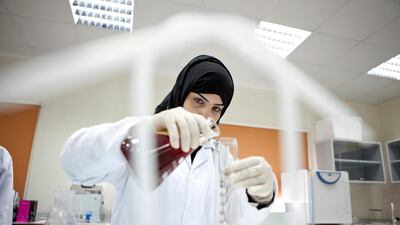Around the globe, women are significantly under-represented in the fields of science, technology, engineering and mathematics (STEM).
According to statistics from the US department of labour, women account for just 26 per cent of the country’s STEM professionals.
Correspondingly, in the United Kingdom, less than a fifth of STEM professionals are women and similar shortages exist across the world's largest economies. As governments explore ways to address the gap, the UAE is steadily developing a generation of Emirati women who will help drive the country's future innovation-led economy. We are proud to be part of this movement.
At more than 50 per cent, the representation of Emirati women in STEM programmes at UAE universities already exceeds international averages. In addition, the number of Emirati women joining the workforce as engineers and scientists has risen significantly in past years. Female nationals in the nuclear sector, for instance, have tripled between 2014 and 2015, according to a report by the UAE mission to the International Atomic Energy Agency (IAEA).
These developments did not materialise overnight, nor are they coincidental. In the past, stereotypes may have dissuaded Emirati women from pursuing careers in areas that were primarily male-dominated, including electrical and mechanical engineering, robotics, computing and information technology and nuclear science. However, the UAE's consistent efforts to empower women over the years have helped to break these stereotypes. Substantial investment in STEM education and the creation of job opportunities in primary growth sectors have encouraged more women to pursue studies in STEM disciplines. In addition, close collaboration between government entities and prominent national organisations has helped to accelerate the development of qualified Emirati cadres.
In 2015, for example, Abu Dhabi Education Council (Adec) and Mubadala formed a partnership to align education with career opportunities in industries that are at the heart of Abu Dhabi’s long-term economic diversification programme. The strategic partnership was formed to build infrastructure in curricula, laboratories, knowledge portals, experiential learning, teacher training and applied research, in order to develop talent and knowledge in STEM fields. Mubadala has also formed partnerships with aerospace leaders including Boeing, Airbus, BAE Systems and Lockheed Martin to offer training to school pupils, university students and recent graduates.
__________________________
Read more:
Emirati Women's Day: lawyer told women 'too emotional' for legal profession
104-year-old woman gears up for Hajj
__________________________
Such initiatives are in line with Abu Dhabi’s wider economic vision, which emphasizes the creation of high-value employment opportunities for nationals, and maximizing the participation of women in the workforce. This is alongside the UAE’s vision to establish our nation as a sustainable, knowledge based economy, with innovation, research, science and technology forming its pillars. Given that women account for about half of the UAE population, there lies significant potential to harness their skills in delivering long-term benefits for the country. In fact, according to a study by the management consulting firm Booz Allen Hamilton, increasing the participation of female Emirati talent in STEM fields to the level of their male counterparts, could boost the UAE’s GDP by an estimated 12 per cent.
The nation’s combined efforts in this realm are beginning to bear fruit. Mubadala’s partnership with Adec, as well as its numerous talent development initiatives targeting Emirati women, have resulted in scores of female Emirati leaders and technical and engineering professionals joining Mubadala’s aerospace, ICT, utilities and healthcare assets. 41 per cent of employees at Al Ain based aerostructures manufacturing facility Strata are women. The company, which supplies Boeing and Airbus, currently has 700 employees, half of which are UAE nationals. Similarly, Emirates Global Aluminium (EGA), which also falls under Mubadala’s umbrella, is a strong proponent of developing Emirati women in heavy industry, with several of the company’s senior supervisors and leaders being national women.
The UAE’s future growth will rely heavily on highly-qualified, Emirati visionaries and professionals playing a prominent role in filling functions that are crucial to the economy. Organisations that are leading the country’s technology and innovation drive, such as Mubadala, will continue to be key partners in the development, empowerment and education of future Emirati female innovators, leaders and pioneers.
Iman Al Qasim is the executive director for human capital at Mubadala Investment Company

